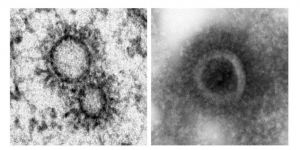A study at the Centro Nacional de Biotecnología of the CSIC (CNB-CSIC), in collaboration with the Pasteur Institute, has shown how the influenza virus builds a membranous organelle in which molecules of the virus genome are deposited; they later accumulate at the cell plasma membrane, where new viruses are produced. This research involves a major change in our knowledge of influenza virus infection and could lead to development of new therapies and drugs to combat flu. The article was published in the journal Nature Communications.
To date, research suggested that the flu virus used cell organelles known as recycling endosomes, with which it transported the molecules of its genome from the cell nucleus –where they are manufactured– to the periphery –where new viral particles form.
This study, which used advanced optical and electronic microscopy techniques, nonetheless shows that the influenza virus constructs a completely new organelle in which molecules of the virus’s genome are transported. "In our research, we discovered that the influenza virus builds an organelle from membranes of the endoplasmic reticulum, which is the largest membranous organelle in the cell. It is where proteins are synthesized and modified, and lipids are manufactured," explain Isabel Fernández and Cristina Risco, CNB-CSIC researchers.
In the study, the scientists also found that the new structure built by the virus incorporates proteins from recycling endosomes. "Virus genome molecules adhere to the surface of these large vesicles, and are later deposited on the cell plasma membrane to manufacture new viruses," said Fernández and Risco.
The influenza virus is one of the main pathogens that affect humans, and current treatments are limited by the virus’s ability to mutate. Thanks to this finding, however, it has been possible to isolate the organelle for structural characterization. "This organelle, called the irregularly coated vesicle, could become a target for new drugs to fight the influenza virus", adds Fernández.
- Isabel Fernández de Castro Martin, Guillaume Fournier, Martin Sachse, Javier Pizarro-Cerda, Cristina Risco, Nadia Naffakh. 2017. A new class of Rab11-dependent vesicles transports influenza virus genome from a modified endoplasmic reticulum to the plasma membrane. Nature Communications. DOI: 10.1038/s41467-017-01557-6






